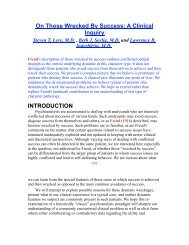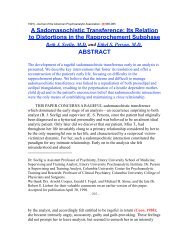The Rape of Medusa - Beth J. Seelig, MD
The Rape of Medusa - Beth J. Seelig, MD
The Rape of Medusa - Beth J. Seelig, MD
Create successful ePaper yourself
Turn your PDF publications into a flip-book with our unique Google optimized e-Paper software.
mother in the area <strong>of</strong> creativity. As told by Ovid, the young Arachne was very<br />
proud <strong>of</strong> her outstanding ability as a weaver and made the serious error <strong>of</strong><br />
challenging Athena to a weaving competition. Her skill was so great that her<br />
product rivalled that <strong>of</strong> the goddess. As punishment, Athena turned Arachne into a<br />
spider.<br />
Athena owes her possession <strong>of</strong> <strong>Medusa</strong>'s head to her intelligence, which<br />
is appropriate to her role as the goddess <strong>of</strong> wisdom. It was her advice to<br />
Perseus—to use the indirection <strong>of</strong> <strong>Medusa</strong>'s image reflected in his shield<br />
to avoid looking at her—that made it possible for him to slay <strong>Medusa</strong>,<br />
the only mortal Gorgon. <strong>The</strong> male hero Perseus, who, in turn, renounced<br />
the regressive implications <strong>of</strong> <strong>Medusa</strong> by giving her head to Athena, thus<br />
carried out Athena's wise advice. <strong>The</strong> pervasive appeal <strong>of</strong> the Gorgon's<br />
power is evidenced by its traditional use as an armour or shield device<br />
throughout Western Europe—as if the wearer triumphs over his enemy<br />
with the aid <strong>of</strong> <strong>Medusa</strong>'s petrifying glance. Unlike Perseus, Arachne fails<br />
to renounce her childhood attachments and follow Athena's advice. As a<br />
result, rather than pr<strong>of</strong>it from Athena's wisdom as Perseus did, Arachne<br />
insists on pursuing the competition (Adams, 1990, p. 598).<br />
In this reading, the (bad) competitive feelings reside in the junior female<br />
Arachne. Athena is not described as competitive. However, it is she who avenges<br />
herself by transforming the unfortunate young woman into a spider. <strong>The</strong> spider is,<br />
like <strong>Medusa</strong>, frequently regarded as a figure <strong>of</strong> horror. Additionally, the multiple<br />
legs <strong>of</strong> the spider are much like the multiple snakes <strong>of</strong> <strong>Medusa</strong>'s hair and the<br />
spider has long been regarded as symbolic <strong>of</strong> the bad mother (Abraham, 1923)<br />
and as a ‘polyphallic’ creature, symbolising the castrated female genital (Flügel,<br />
1924). Thus, Athena transforming her rival into a spider is another version <strong>of</strong> the<br />
transformation <strong>of</strong> the young <strong>Medusa</strong>. In the case <strong>of</strong> Arachne, her successful effort<br />
to surpass the goddess in weaving is unacceptable, while in the case <strong>of</strong> <strong>Medusa</strong>,<br />
the young girl's success in attracting her father is severely punished. In both cases,<br />
the junior female victim <strong>of</strong> the older woman's hostile competitiveness is blamed<br />
and severely punished for her success.<br />
Electra, Clytemnestra and Agamemnon<br />
<strong>The</strong> term ‘Electra complex’ comes from the story <strong>of</strong> Electra, daughter <strong>of</strong><br />
Agamemnon, leader <strong>of</strong> the Greeks in the Trojan War. I am using the Oresteia <strong>of</strong><br />
Aeschylus (1984) as my source for this myth. Clytemnestra is Agamemnon's wife<br />
and Electra's mother. Having taken a lover during Agamemnon's long absence,<br />
Clytemnestra murders her husband on his return. She has several reasons for<br />
murderous rage at her husband. He had previously sacrificed another daughter,<br />
Iphigenia, to gain a favourable wind for the Greek assault on Troy to recapture the<br />
abducted Helen at the beginning <strong>of</strong> the Trojan War. Also, he returned from the war<br />
with a concubine, the Trojan prophetess Cassandra, who is also killed by<br />
Clytemnestra. As the story is generally told, Electra in turn became murderously




